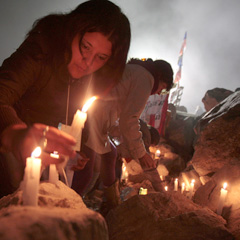Families believe 'miracle' saved 33 Chilean miners
By Aaron Nelsen, Catholic News Service SANTIAGO, Chile - Diana Olivares' husband, Daniel Sanderson, had one foot out the door before a gentle nudge from his wife convinced him to stay with the family instead of heading to the mine for work.
SANTIAGO, Chile - Diana Olivares' husband, Daniel Sanderson, had one foot out the door before a gentle nudge from his wife convinced him to stay with the family instead of heading to the mine for work.Later that day, the couple received word that the San Jose mine where Sanderson worked had collapsed, trapping 33 miners, including Olivares' cousin, Carlos Buge.
For 17 days and nights, the families of the trapped miners crowded in tents at Camp Hope outside of the mine, many of them turning to the Church and praying that their loved ones would be rescued from the belly of the Atacama Desert in northern Chile.
With each passing day, the likelihood the miners would be found alive faded, but Olivares never lost faith.
And then the improbable happened: The miners were found.
"For me, it was a miracle what happened here," Olivares said from outside the mine.
Many in this nation of nearly 17 million share Olivares' view of the dramatic events of Aug. 22, when the 33 miners feared dead unexpectedly let the world above know that they had indeed survived.
While Olivares has little doubt that a miracle transpired, the Catholic Church has been more cautious in its public statements. Bishop Gaspar Quintana Jorquera of Copiapo, Chile, who has spent several days at the mine offering support to the families and celebrating Mass, declined to call the discovery of the men a miracle. He said the requirements for such a determination were clear.
"Theologically, it can't be argued," Quintana told the press. It was a great event, "but not a miracle."
The bishop was on his way to the mine when he heard that there had been a message from the miners. He admitted believing there was little chance of finding the men alive.
Prior to the mine collapse, Quintana had been an outspoken critic of mine operator San Esteban, which reopened the San Jose mine in 2008 after it was closed because of safety violations a year earlier.
"I've been careful not to say things that don't correspond, but clearly there exists abuse on the part of the company," Quintana told Catholic News Service by telephone. "There is exploitation and poor treatment. They should understand that the miners aren't beasts of burden."
Meanwhile, the vigils continue outside of the San Jose mine. Alonso Contreras, a liturgical dancer and member of the Virgin of Candelaria, an organization devoted to St. Mary, has led nightly prayer services for the people at Camp Hope. His cousin, Carlos Barrios Contreras, is one of the trapped miners.
Contreras has exchanged letters with his cousin since a hole was drilled 700 metres down to the chamber where the miners took refuge. In their correspondence, the miners have asked that their wives and children look after one another; they have requested their favourite foods, cigarettes and other diversions. Mostly, the trapped men want to feel supported, Contreras said.
In his first letter, Barrios acknowledged that he never considered himself religious, but what he wrote in the second paragraph made Contreras cry.
"He told me, 'Cousin, now I believe in God, I believe completely,' ” Contreras said.
In the days before the men were found, Contreras witnessed the gamut of human emotion.
"Many people here said 'I have to stay strong.' Others said, 'No, the authorities are lying to us. They must be dead. Tell us the truth,' ” Contreras said. "These are moments of human weakness that affect us all, but the other day, just before they were found, we said, 'No, our faith is strong.' ”
Please support The Catholic Register
Unlike many media companies, The Catholic Register has never charged readers for access to the news and information on our website. We want to keep our award-winning journalism as widely available as possible. But we need your help.
For more than 125 years, The Register has been a trusted source of faith-based journalism. By making even a small donation you help ensure our future as an important voice in the Catholic Church. If you support the mission of Catholic journalism, please donate today. Thank you.
DONATE
